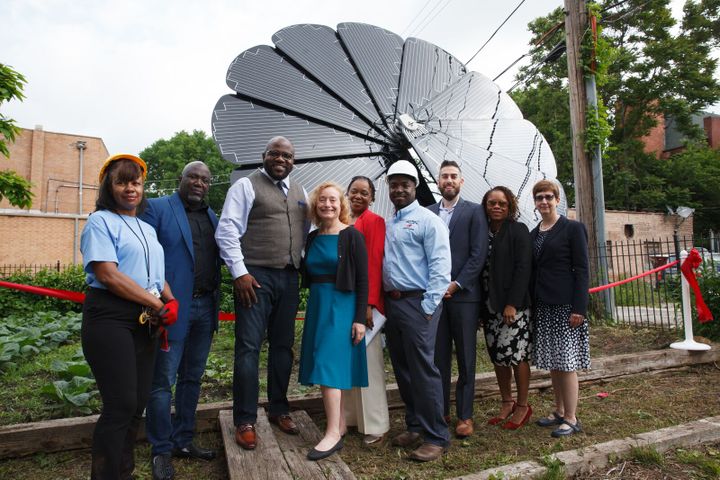Through an ongoing collaboration with Mohawk Group, Groundswell recently worked with Chicago-based nonprofit Elevate Energy – a fellow Citi Foundation Progress Maker -- to install a SmartFlower solar system in a community garden in South Chicago’s Bronzeville neighborhood.
Elevate Energy is devoted to creating efficiency programs for working communities, and the organization has seen opportunities spike since the passage of Illinois’ landmark clean energy law in 2016. The Future Energy Jobs Act (FEJA) expanded existing utility energy efficiency programs, placed an emphasis on community solar, and included job training provisions designed to benefit low-income and environmental justice communities, all priorities for Elevate Energy.
Thanks to a grant under FEJA, Elevate Energy broadened the SmartFlower installation event in Chicago with a training program where participating students learned about the project in advance and then observed the installation. Groundswell caught up with Elevate Energy’s Contractor Development Coordinator Eya Louis to discuss how the SmartFlower operates, the importance of the training program for students, and the job fair that followed.
On how the SmartFlower works.
The SmartFlower is a giant sunflower-like sculpture that was installed close to a community garden located in the Bronzeville neighborhood in the south side of the city. In its resting state, it folds up. At a designated time, or when the sun is rising, it opens up and has 12 solar panel “petals.” During the course of the day, it moves from East to West.
It’s a visually pleasing installment, as well as a great conversation piece for anyone in the neighborhood.
At our kickoff event for the SmartFlower project, we had our solar trainees there so they could witness some of the things that went into the installation. The instructor talked to them about what the permitting process looked like and will continue to be a point of contact for them, since one of Elevate Energy’s priorities is to make sure each project involves education and employment components.
On the landmark law (FEJA) benefiting working and environmental justice communities.
The law is designed to expand energy programs that broaden customer savings and provide options for the commercial, industrial and partial-to-low income customers. There’s a commitment to direct roughly $750 million to low-income communities. The other major thing it does is include a provision for job training in the renewable energy field. So it’s not only promoting clean energy but providing clean energy jobs to those located in areas that have historically been disenfranchised.
On FEJA and advancing employment opportunities.
Solar technology in and of itself is just a really great opportunity because the wages — even at entry level — are significantly higher than a lot of other fields. The social and environmental justice benefits are intertwined by helping individuals who live in the communities where a lot of the projects will take place over the next few years.
Placing individuals from these communities in the jobs that are taking place within their own communities and making that connection is very important because, typically, that has not happened. A lot of the jobs and opportunities that have come into communities are coming from outside, and I think that’s difficult for residents to see. They feel left behind and that’s not the case with this legislation, because of the job training component embedded within in it.
On upcoming projects.
We just graduated the first of four cohorts for solar PV installer training. We’ll have classes through 2021. We’re connecting our trainees directly with contractors that are currently in the solar market or taking steps to get into the solar market in Illinois. At the conclusion of the class, we host a job fair.
The other thing we’re doing is a contractor accelerator program, which is for contractors interested in expanding their offerings to solar. We help them navigate what that looks like — between what the new law means and what it means to them as a contractor, as well as how to connect with developers and potentially other contractors who are either minority women or veteran-owned so they can apply for projects that will come online relatively quickly in Illinois.
